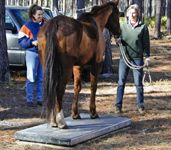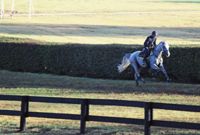Sport horse nutrition: Winning is in the details
A new study in top equine athletes brings nutritional deficiencies into the spotlight.
Riders competing at an elite level must pay attention to all manner of details (Photo 1). They are usually fastidious about their tack and equipment, to the point of being obsessive. It has to be the correct saddle and saddle pad combination. The helmet must fit comfortably and securely, the boots can only be of a certain style and manufacture, and only certain riding gloves will do. Their horses must be groomed and turned out correctly.

Photo 1: Riders weigh their endurance horses with portable scales to monitor hydration status preparedness before a competition and to track loss and recovery during and after rides. This generates a wealth of information.
Trainers at this level fall into an obsessive, micromanaging role with workouts and preparation as well. Racehorses and Olympic competition horses (e.g., those that compete in dressage, show jumping, eventing and endurance) are ridden to meticulous schedules, sometimes with each session written out in advance and commented on afterward, as a means of achieving optimal athletic performance.
And yet, with all this attention to detail, new research shows that often neither riders nor trainers are as aware of the nutritional management needs of their elite equine athletes as they might think they are. Sure, dietary choices, feeding schedules and supplement use may be discussed and decided on, but the reality seems to be that most elite riders and trainers "forfeit the intimate knowledge of their horse's feeding to their staff," says Elizabeth Owens, equine business manager of Ridley AgriProducts and the consulting nutritionist to the Australian Equestrian Team.
Falling short in nutritional oversight
Most trainers oversee many equine athletes, all in various stages of development and often in different locations. Upper-level riders are generally working numerous horses and often adding in teaching or clinics to their duties. "This necessitates the employment of staff to supervise the daily management of their horses," says Owens (Photo 2).

Photo 2: A typical busy stable feed room illustrates all the choices facing riders and trainers. Usually the barn employees help feed the horses and are responsible for doing so correctly and for knowing which horses are eating well or not.
She conducted a two-year study that consisted of an extensive evaluation of the feeding and work practices of members of Australia's equestrian team. While she found some interesting practical information of importance to upper-level equine competitors, the most striking finding in her work was the often uninformed attitude toward nutrition displayed by even elite riders and managers.
"During this study," says Owens, "I discovered instances in which riders were ignorant of their horses' level of feed intake or rejection and were unaware that certain ingredients were being excluded from the diet, due either to lack of availability or grooms who simply forgot to include that ingredient."
Australia continues to dominate international three-day eventing competitions, having won an Olympic Team Gold medal at the last three Olympics. Yet it is this same success that makes it harder, in Owens' opinion, to make changes and advances in the nutritional care of elite sport horses. "Ingrained, inappropriate feeding practices persist even among elite competitors," says Owens.
But when you are winning, it can be difficult to get riders and trainers to make changes—even changes for the better. "Quite often," she says, "the lack of a problem is the greatest hindrance to improving feeding practices and nutrition of sport horses."
Daily feed intake
One of the simple pieces of information uncovered in Owens' study was the potential importance of daily feed intake. She found that eventing horses consumed an average of between 1.48 and 2.45 percent of their body weight, dressage horses consumed between 1.04 and 1.79 percent, while show jumpers consumed between 1.09 and 2.55 percent. This is significant because it points out that not all elite equine athletes are alike, and horses from different disciplines have different daily feed intakes (Photo 3).

Photo 3: A horse training in the Kentucky Horse Park before the 2010 Alltech FEI World Equestrian Games held in October in Lexington, Ky. Horses competing in different disciplines require differing food intake percentages.
The National Research Council (NRC) suggested daily intake for working horses is between 2 percent and 3 percent of body weight. A study of 25 racing Thoroughbred and Standardbred stables showed good correlation to NRC-suggested intakes, but it becomes clear that requirements vary for differing breeds and disciplines.
"These results illustrate how important it is for each horse to be fed as an individual and why it is sometimes necessary to be critical of feed manufacturers' recommendations for feed allowances," says Owens. Not taking these subtle, but important, differences in intake need into consideration might result in unwanted weight gain, reduced performance and reactions to increased, unneeded protein or carbohydrates such as skin bumps or urticarial reactions, changes in manure consistency and behavioral problems (excessive activity, anxiousness and inattentiveness).
Body weight
Body weight is another detail that can have significance for the elite performance horse. Decreases in weight can be an early indicator of a problem, with possible causes ranging from training concerns to medical or lameness issues to physiological or stress factors.
A study done by Susan Garlinghouse, DVM, MSc, at the 1999 Tevis Cup 100-mile endurance ride showed a strong correlation between body condition score (BCS) and the ability to successfully finish the race. Non-finishing horses had an average BCS of 2.9, while BCS for the finishers averaged 4.5.
Horses that are training well and improving condition generally have good appetites and stable to slowly increasing body weights. Overtrained and stale horses will not eat well and may show subtleties in weight loss, if riders and trainers look for them.
"Generally, riders are not aware of the actual weights of their horses, nor the normal range for variation of those body weights in response to work intensity, climate or feed changes," Owens says.
Diet supplementation
To achieve the ultimate goal of ensuring that the performances of Australia's equine athletes are not being limited by suboptimal nutrition, it was important in Owens' study to evaluate the feeds and supplements being used and to determine any dietary deficiencies. Of the 22 horses investigated in her study, only one eventer and three dressage horses were deemed balanced and, therefore, received no additional vitamin or trace mineral supplementation.
In contrast, 17 of the 22 were receiving inadequate levels of vitamin E (< 1,000 IU/day). Because vitamin E is important in its role for muscle function, it is easy to see how small changes or deficiencies can contribute to suboptimal performance and a horse that is simply not working to its potential. Nine horses were receiving sodium at a level significantly lower than the NRC recommendations, and four others were deficient in other minor vitamins.
The take-home message
It is worth noting that this study was done among the best equine athletes in a nation that is currently one of the top sport-horse countries in the world. This is an extremely successful program, and yet there are still some areas for improvement.
"While some of the participants in this study had a clear grasp of the principles of basic equine nutrition, several were confused about feeding and viewed nutrition as a low priority in the performance of their horses," Owens says.
It brings into question how much nutritional knowledge and attention exists in the smaller, less elite and less successful programs that veterinarians consult with routinely. Encouraging clients to learn about and integrate new nutritional information and high-quality feeds and supplements into their established feeding programs is one area that veterinarians can still make a significant contribution to the performance of the equine athlete.
Dr. Marcella is an equine practitioner in Canton, Ga.